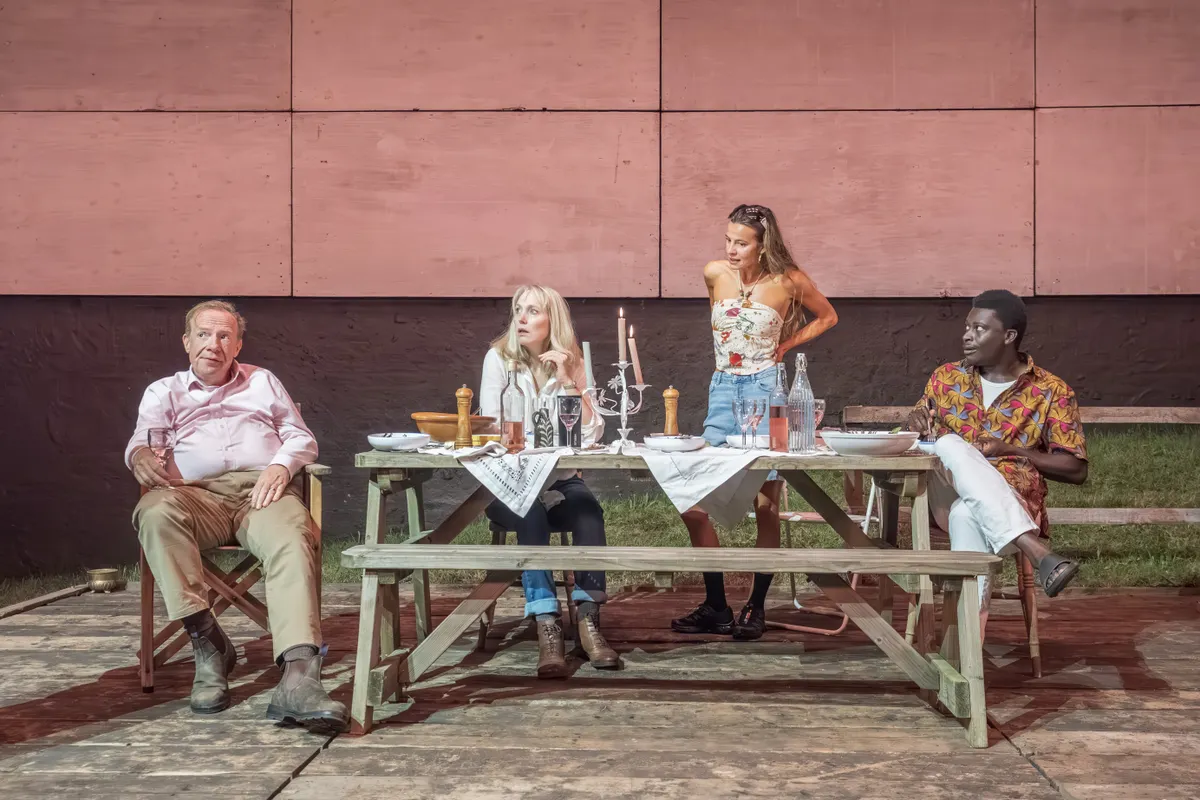Review: JUNIPER BLOOD at Donmar Warehouse
The pastoral idyll of a green and pleasant land is the joint aim of Lip (Sam Troughton) and Ruth (Hattie Morahan) in Mike Bartlett’s back-to-nature farmstead drama, JUNIPER BLOOD. But is rewinding the planet’s eco-clock a theoretical pipe dream? When in reality, seven billion human inhabitants are used to instant communications, modern healthcare, and have grown dependant upon a plentiful and varied food supply chain, just how fragile will the couple’s unified approach become, when pregnancy is thrown into the mix?
 Juniper Blood at Donmar Warehouse production image.
Juniper Blood at Donmar Warehouse production image.
On an uber-realistic grassy mound set by ULTZ, (so real, that early in proceedings a mouse ran out from beneath the wooden staging platform and disappeared beneath patrons’ feet), James Macdonald directs his cast of five over three acts with two intervals. It is a testament to Bartlett’s snappy and engaging dialogue, that despite the rural pace of proceedings, the play races by. Introspective and slightly unnerving, Lip isn’t one for small talk. He broods and ponders as Ruth busily prepares for an outdoor meal for their visiting guests, which include her former step-daughter Milly (Nadia Parkes) and her academic friend Femi (Terique Jarrett) who is studying agriculture at Oxford. Joining them at the table is Tony (Jonathan Slinger), the jovially sardonic owner of the much larger adjoining property, where his modern farming methods (and subsidies) ensure he turns a decent profit.
What unfolds is an exploration of the multi-headed monster of impending ecological collapse, seen through the eyes of the characters whose opinions develop, alter and clash as they butt up against the practical requirements of modern life and the individual challenges it presents.
Lip is all-in, bemoaning the lack of worms in the soil, planting trees and determined to encourage a life in tune with nature. His glib eschewing of a mobile phone and even the healthcare system for his child, is in direct contrast to Ruth’s determined stance on an eco-friendly, but significantly more practical future. When Lip avoids answering her direct hypothetical question about the use antibiotics, we sense her mother’s instincts kick-in and that for her, a red line has been crossed.
Milly is still enveloped by the juvenile and largely suppressed trauma of life with her father and initially rails against ubiquitous misogyny, whilst playful Femi is prone to intellectualising and delivering textbook diatribes with a light jocularity which comes close to insincerity.
Tony’s loneliness since the loss of his wife to cancer, combined with a genuine attraction and concern for Ruth whom he regards as a truly good person, results in a clumsy but heartfelt proposition. Slinger’s delivery offers one of the more arresting moments in the piece as his engaging bluntness gives way to resigned stoicism, such is his country courteousness.
Helen Skiera’s excellent and subtle sound design lends understated substance to the overall country atmosphere without ever becoming intrusive. The expected farm and nature noises, including the background hum of farm machinery, are always present but never intrude, such that even the ping of a mobile message, sounds genuinely as though it has been part-muffled when retrieved from a pocket.
JUNIPER BLOOD continues at the Donmar Warehouse until 4th October.
Latest News

 I'M EVERY WOMAN - THE CHAKA KHAN MUSICAL moves London premiere to Hackney Empire
2 March 2026 at 16:12
I'M EVERY WOMAN - THE CHAKA KHAN MUSICAL moves London premiere to Hackney Empire
2 March 2026 at 16:12

 KINKY BOOTS at London Coliseum - Rehearsal images released
2 March 2026 at 13:57
KINKY BOOTS at London Coliseum - Rehearsal images released
2 March 2026 at 13:57

 Review: SEA WITCH at Theatre Royal Drury Lane
2 March 2026 at 12:07
Review: SEA WITCH at Theatre Royal Drury Lane
2 March 2026 at 12:07

 YENTL at Marylebone Theatre - Rehearsal images released
2 March 2026 at 08:25
YENTL at Marylebone Theatre - Rehearsal images released
2 March 2026 at 08:25